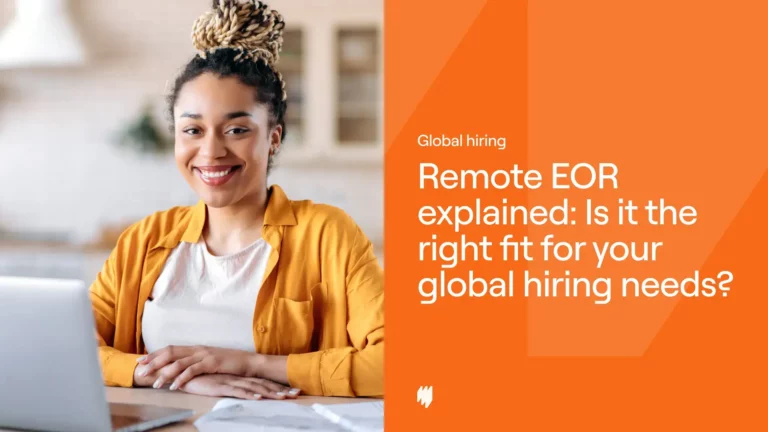An Employer of Record or EOR allows businesses to employ local workers legally without having to set up a local entity in a given country. It manages HR functions such as payroll processing, employee benefits, taxes, leaves, and contracts. An EOR enables businesses to compliantly manage employees overseas by establishing a legal presence on behalf of their clients.
However, not every company works at a global level from the start, it really depends on the business’s requirements and goals. Keeping this in mind, business owners must first understand what is the right time to use an employer of record. However, before considering an EOR, employers must take a look at the various employment solutions available in the market.
When should You Use an Employer of Record
Typically, the right time to use an employer of record may be when a business considers hiring international employees. However, there are many other aspects to this. Here are a few cases when it might be the right time to use an employer of record.
Global Expansion
Hiring employees in the country a business wishes to expand would be one of the first steps to global expansion. It helps gathering a local team of experts and get a head start on tasks like market research, client outreach, etc. This would be the right time to use an employer of record since it makes operations like onboarding and payroll extremely easy.
Get a closer look at Multiplier’s EOR platform
Hiring international employees
Multiple businesses take the route to international hiring to get access to global talent at relatively affordable rates. For example, a lot of businesses in the US choose to outsource sales, customer service, and IT related roles to countries in the APAC region. It helps them fetch the best talent in countries where the US Dollar is more valuable, hence saving a lot of money. This maes for the right time to use an employer of record as these services enable clients to skip the procedure of setting up an entity and focus on team building.
Hiring multiple international freelancers
Many a time, businesses find themselves hiring multiple international freelancers for short-term or long-term projects. While this is more accessible than setting up international teams, it can become challenging when it comes to managing these freelancers. Every country has different tax and compliance rules and it gets very challenging for an in-house HR team to keep track of them. Here, it becomes the right time to use an employer of record as many EOR services also support freelancer onboarding and management, which takes a lot of weight of an employer’s shoulders.
These were some of the scenarios that indicate that it is the right time to use an employer of record. Today, HR management has brought forth many solutions that companies may avail for their global hiring needs. EORs, being one of them, generally take on the employment legalities and liabilities for their clients. To give you a better understanding of when and where EORs are used, let us compare them against other services and discuss their scope and distinct features:
Employer of Record vs. PEO
A Professional Employer Organization (PEO) is the closest to an EOR in terms of its services. However, its function lies in the recruitment aspect of employment. This intermediary organization helps businesses with employee onboarding, payroll processing, taxes, and HR compliance.
While it may seem that a PEO functions the same as EOR, the main difference is that the former requires the company to have a local entity in the country where your employee belongs. Therefore, if a business already has an entity in its target country, it may not be the right time to use an employer of record.
Employer of Record vs. Legal Entity Setup
When expanding in another country, an international entity setup is created to be a company’s foreign representation. This is ideal for businesses wanting to establish credibility and accessibility for local talents in their chosen area. However, this business scheme would entitle companies to undergo tedious paperwork, costing hundreds of thousands of dollars to get the operation going.
EORs skip this step entirely by standing in as the company’s local entity. It may be the right time to use an employer of record for businesses that do not have the financial resources to set up entities outside of their home country.
Employer of record vs. Staffing agency
There is a stark contrast between Staffing Agencies and EORs. A Staffing Agency matches employees to businesses looking to fill their available positions. They provide suitable workers for companies or seek out and screen potential candidates on behalf of their clients. Once their recommendations are approved, agencies charge a markup of the employee’s wage as payment for their services.
On the other hand, EORs are not involved in the recruitment process. Its primary function lies in the administrative aspects of maintaining HR tasks. Therefore, if a business needs extensive candidate sourcing, it may not be the right time to use an employer of record.
Employer of Record vs. Subsidiary
A Subsidiary is a company partially owned by a larger parent or holding. This is ideal for large businesses intending to expand operations and establish a physical presence in a given area. Subsidiary companies are distinct legal entities and completely independent of their counterparts since they will observe the laws where it is located.
EOR functions as a subsidiary on behalf of its clients in the aspect of employing local workers. Therefore, if the business needs call for setting up a subsidiary, then it may not be the right time to use an employer of record. However, a PEO service may still be useful in this case.
Considering these differences, business owners can get an idea of what service can be the most useful for their business. Employer of record services generally take care of everything from onboarding to taxes and benefits, and also offer a few additional features over other services.
The Advantages of EOR in Global Hiring
A Global Employer of Record service is designed to be a cost-effective way for businesses to explore and diversify their human resources. It makes global expansion easier for any company and promotes safe hiring practices due to its emphasis on legal compliance. Listed below are some of the benefits of EORs:
Legal Compliance and Monitoring
EORs are handled by legal specialists that will ensure that employees are hired according to their country’s labor code. Moreover, these industry experts will be on top of any regulatory changes within each area and will ensure that it is appropriately applied to each worker. Businesses will only have to seek their expertise and be up to date with the latest developments in employment law.
A cost-effective way for businesses expansion
Partnering with an EOR skips the incorporation process for companies seeking to hire employees outside their country. Businesses do not need to undergo tedious documentation and costly registration processes just to explore the talent market in their target area. EORs will serve as the legal entity for their clients to handle HR administrative functions.
Ensures competitive benefits, payroll management, taxes
An EOR protects employees by ensuring they receive the minimum required benefits upon their employment. EORs manage the appropriate payroll calculations and tax deductions for each worker. Businesses may also opt to customize benefits by adding to what is required in each state or country.
Risk Management
EORs understand the legal risks associated with hiring in each country. They know how to navigate the complexities of employment so businesses would not have to worry about legal uncertainties in the industry. EORs aim to guide and disclose each employment component to empower companies when hiring anywhere in the world.
Now that the advantages of using an EOR are clear, founders must carefully evaluate their potential EOR partners and choose the one that fits best.
What to look out for when choosing an EOR
Now that we have highlighted when an Employer of Record is used, and the advantages of partnering with them, the next step that companies must take into consideration will be how to choose the right provider for their business. Here is a checklist to guide you through the decision-making process of selecting an EOR service:
- Do they operate globally or cover the countries/ areas you are targeting?
- Is Data Privacy and Confidentiality explicitly mentioned in the contract?
- Do they have an easily accessible Customer Service that will aid you should any complication arise?
- Are they transparent on their pricing and scope of services?
- Do they assign account managers to serve as your point of contact?
Answering these questions will help with getting a clear idea of what the business needs and aligning company goals with the partnership. Here’s why Multiplier can be the best option when it is the right time to use an employer of record.
Get a Head Start on Global Expansion with Multiplier
Multiplier’s EOR services allow businesses to legally manage their team wherever they may be. Our SasS-based platform promises an easier way to streamline payroll processes, benefits, and expenses.
Multiplier has a massive portfolio of over 150 countries that you can hire from without setting up a single foreign entity. We take care of onboarding, IT asset delivery, benefits, and payroll. You get to work with the employees you choose, in the countries you choose!
We can generate 100% compliant, multilingual contracts employment contracts in any country in just a few minutes.
Our legal team ensures that all the labor codes and mandatory tax deductions are followed and your business stays away from any compliance issues.
Sounds interesting? Book a demo and start your journey to building cross-cultural teams now!
FAQs
Q. Are you sharing our data with any third parties?
Multiplier is engaged with third parties to ensure that our clients get the most benefit from our platform. But in doing so, any information shared with the company or with any third parties involved will remain confidential and will not be shared other than its intended purpose.
Q. Do you own entities in different countries? or are you dependent on third parties?
Multiplier currently has over 150+ local entities across APAC, Europe, and the Americas. We may work with third parties to better serve the needs of our international clients.
Q. Is all documentation and information centralized in one software hub?
Multiplier stores all documents in its databases. For contracts, we partnered with a third-party vendor to generate them and make them available in our software for easy access.
Q. How will the EOR help you if you need to end an employment agreement?
Multiplier helps with the offboarding process to end an employment agreement. Our platform ensures that the entire contract is drafted compliantly and according to the employee’s labor law jurisdiction.







